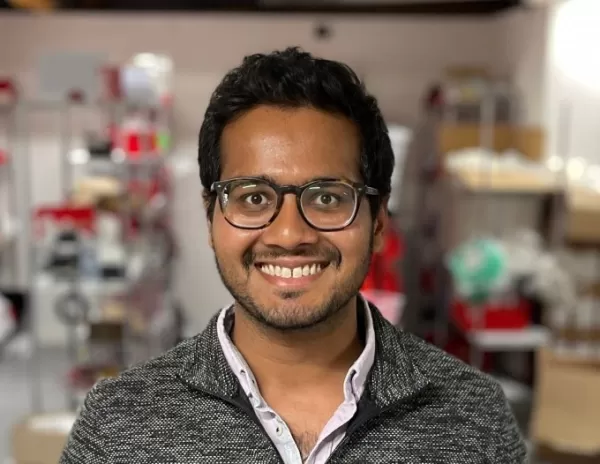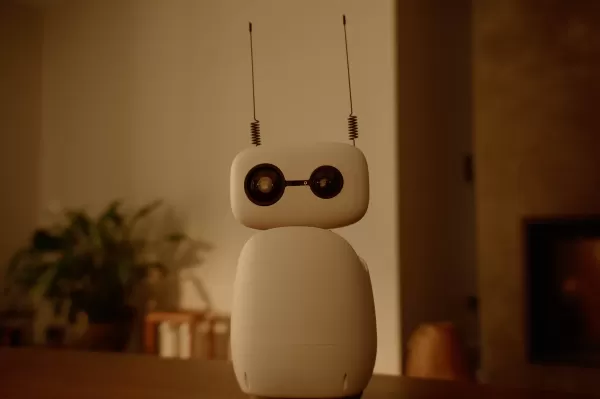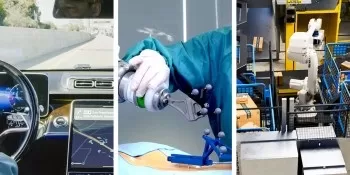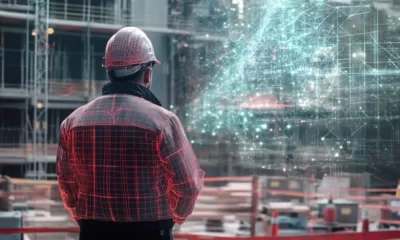Chef Robotics Achieves Success by Rejecting Initial Clientele
A few years back, Chef Robotics was on the brink of collapse. Founder Rajat Bhageria openly shared with TechCrunch that there were times he seriously considered throwing in the towel. "There were a lot of dark periods where I was thinking of giving up," he admitted. Yet, buoyed by the support of friends and investors, he pushed forward.
Fast forward to today, and Chef Robotics isn't just surviving; it's thriving as one of the few successful food tech robotic companies. After securing a $23 million Series A, the company now boasts 40 employees and prestigious clients like Amy’s Kitchen and Chef Bombay. Bhageria proudly states that their robots, installed across the U.S., have produced 45 million meals to date. This success story stands in stark contrast to the numerous food tech robotics startups that have failed, such as Chowbotics with its salad robot Sally, pizza delivery robot Zume, food kiosk robot Karakuri, and the more recent agtech Small Robot Company.
Bhageria credits his company's turnaround to a bold move: rejecting signed contracts and millions in potential revenue. This decision stemmed from a fundamental challenge in robotics known as the grasping problem.
Bhageria's journey into robotics began with his master’s degree at UPenn’s GRASP Lab, fueled by a vision of a future where robots handle household chores, mow lawns, and cook gourmet meals. However, the reality is that robotics still struggles with the delicate task of grasping different objects without damaging them. "Nobody's built a dataset of how do you pick up a blueberry and not squish it, or, how do you pick up cheese and not have it clump up?" Bhageria explains.
Initially, Chef Robotics aimed to automate fast casual restaurants, an industry plagued by labor shortages. Despite securing multimillion-dollar contracts, the team hit a wall. "We essentially could not solve the technical problem," Bhageria said. The challenge was building a robot versatile enough to handle a variety of ingredients without extensive training data. When Bhageria proposed installing robots for just one or two ingredients to gather data, his potential customers declined.
This rejection led to a pivotal moment for Bhageria. "It honestly sucked, because I spent the last year and a half of my life trying to convince these people, these fast casual companies, to work up with us," he recalled. Realizing he needed a different approach, he shifted focus.

Chef Robotics founder Rajat BhageriaImage Credits:Chef Robotics
Fundraising post-2021 was tough, with venture capitalists wary of the robotics industry's graveyard. "We talked to dozens of different funds," Bhageria said. "We just got rejected over and over." The constant rejections led him to question his path. "You come home and are like, what am I doing in my life? Am I doing the wrong thing? Should I quit?" he remembered.
Yet, persistence paid off. In March 2023, Chef Robotics secured an $11.2 million seed round led by Construct Capital, with additional investments from Promus Ventures, Kleiner Perkins, and Gaingels. The company also found its niche in "high mix manufacturing," a segment of the food industry where companies produce a wide variety of recipes in large quantities, such as meals for airlines, hospitals, or frozen food for consumers.
In this sector, instead of one worker assembling an entire meal, employees work in an assembly line, each adding a specific ingredient. "It’s actually hundreds of humans who are standing in a 34 Fahrenheit room, and they’re essentially scooping food for eight hours a day," Bhageria describes. "So it’s just a terrible job." This industry, too, faces labor shortages, but Chef Robotics' flexible-ingredient robots, developed in collaboration with food makers, offer a solution.
Moreover, the real-world data gathered from these applications is helping Chef Robotics move closer to its original goal of serving fast-casual restaurants. Bhageria remains optimistic about this future possibility.
The renewed interest in AI has also made fundraising "weirdly" easy this time around. Avataar Venture Partners, co-founded by former Norwest VC Mohan Kumar and focused on "AI in the physical world" startups, actively pursued Chef Robotics. Bhageria closed this round in less than a month, with Avataar leading and existing investors like Construct Capital, Bloomberg Beta, and Promus Ventures participating. This latest round brings Chef Robotics' total funding to $38.8 million, supplemented by a $26.75 million loan from Silicon Valley Bank for equipment financing. Bhageria describes the fundraising process this time as "exhilarating."
Related article
 Hugging Face Launches Pre-Orders for Reachy Mini Desktop Robots
Hugging Face invites developers to explore its latest robotics innovation.The AI platform announced Wednesday that it’s now accepting pre-orders for its Reachy Mini desktop robots. The company first s
Hugging Face Launches Pre-Orders for Reachy Mini Desktop Robots
Hugging Face invites developers to explore its latest robotics innovation.The AI platform announced Wednesday that it’s now accepting pre-orders for its Reachy Mini desktop robots. The company first s
 Nvidia charges ahead with humanoid robotics aided by the cloud
Nvidia is charging full speed ahead into the realm of humanoid robotics, and they're not holding back. At the Computex 2025 trade show in Taiwan, they unveiled a series of innovati
Nvidia charges ahead with humanoid robotics aided by the cloud
Nvidia is charging full speed ahead into the realm of humanoid robotics, and they're not holding back. At the Computex 2025 trade show in Taiwan, they unveiled a series of innovati
 Top 5 Autonomous Robots for Construction Sites in April 2025
The construction industry is undergoing a remarkable transformation, driven by the rise of robotics and automation. With the global market for construction robots projected to reach $3.5 billion by 2030, these innovations are revolutionizing safety and efficiency on job sites. From autonomous pile d
Comments (33)
0/200
Top 5 Autonomous Robots for Construction Sites in April 2025
The construction industry is undergoing a remarkable transformation, driven by the rise of robotics and automation. With the global market for construction robots projected to reach $3.5 billion by 2030, these innovations are revolutionizing safety and efficiency on job sites. From autonomous pile d
Comments (33)
0/200
![PeterRodriguez]() PeterRodriguez
PeterRodriguez
 August 19, 2025 at 11:01:21 PM EDT
August 19, 2025 at 11:01:21 PM EDT
Wow, Chef Robotics' turnaround is inspiring! Rajat’s grit to keep going despite nearly giving up shows real founder spirit. Curious how they pivoted their clientele to pull it off! 🚀


 0
0
![JamesBaker]() JamesBaker
JamesBaker
 July 27, 2025 at 9:20:54 PM EDT
July 27, 2025 at 9:20:54 PM EDT
Wow, Chef Robotics' story is wild! Rajat Bhageria nearly gave up, but pivoting away from early clients saved them. It’s like a phoenix rising from ashes—proof that tough calls can lead to big wins. Curious how they picked their new direction! 🔥


 0
0
![JackPerez]() JackPerez
JackPerez
 July 22, 2025 at 3:39:52 AM EDT
July 22, 2025 at 3:39:52 AM EDT
Wow, Chef Robotics'ಮaking a comeback by ditching early clients? Bold move! Sounds like a risky bet that paid off. Curious how they pivoted so fast! 🍳🤖


 0
0
![JosephGreen]() JosephGreen
JosephGreen
 April 20, 2025 at 4:36:05 PM EDT
April 20, 2025 at 4:36:05 PM EDT
Chef Robotics' story is inspiring! Rejecting initial clients was a bold move, but it paid off. The turnaround is impressive, but I'm curious about the specifics of their strategy. Still, it's a great example of perseverance paying off! 🌟


 0
0
![AnthonyJohnson]() AnthonyJohnson
AnthonyJohnson
 April 20, 2025 at 3:33:11 PM EDT
April 20, 2025 at 3:33:11 PM EDT
¡La historia de Chef Robotics es inspiradora! Rechazar a los primeros clientes fue una decisión audaz, pero valió la pena. El cambio es impresionante, pero me gustaría saber más sobre su estrategia. Aún así, es un gran ejemplo de cómo la perseverancia puede dar sus frutos! 🌟


 0
0
![GeorgeJones]() GeorgeJones
GeorgeJones
 April 18, 2025 at 5:45:24 PM EDT
April 18, 2025 at 5:45:24 PM EDT
셰프 로보틱스의 이야기는 감동적이에요! 초기 고객을 거부한 것은 대담한 결정이었지만, 그 결정이 성공으로 이어졌어요. 전환은 놀랍지만, 어떻게 해냈는지에 대한 정보가 더 있었으면 좋겠어요. 그래도, 인내심이 결실을 맺는 좋은 예죠. 계속해서 화이팅, 셰프 로보틱스! 🌟👨🍳


 0
0
A few years back, Chef Robotics was on the brink of collapse. Founder Rajat Bhageria openly shared with TechCrunch that there were times he seriously considered throwing in the towel. "There were a lot of dark periods where I was thinking of giving up," he admitted. Yet, buoyed by the support of friends and investors, he pushed forward.
Fast forward to today, and Chef Robotics isn't just surviving; it's thriving as one of the few successful food tech robotic companies. After securing a $23 million Series A, the company now boasts 40 employees and prestigious clients like Amy’s Kitchen and Chef Bombay. Bhageria proudly states that their robots, installed across the U.S., have produced 45 million meals to date. This success story stands in stark contrast to the numerous food tech robotics startups that have failed, such as Chowbotics with its salad robot Sally, pizza delivery robot Zume, food kiosk robot Karakuri, and the more recent agtech Small Robot Company.
Bhageria credits his company's turnaround to a bold move: rejecting signed contracts and millions in potential revenue. This decision stemmed from a fundamental challenge in robotics known as the grasping problem.
Bhageria's journey into robotics began with his master’s degree at UPenn’s GRASP Lab, fueled by a vision of a future where robots handle household chores, mow lawns, and cook gourmet meals. However, the reality is that robotics still struggles with the delicate task of grasping different objects without damaging them. "Nobody's built a dataset of how do you pick up a blueberry and not squish it, or, how do you pick up cheese and not have it clump up?" Bhageria explains.
Initially, Chef Robotics aimed to automate fast casual restaurants, an industry plagued by labor shortages. Despite securing multimillion-dollar contracts, the team hit a wall. "We essentially could not solve the technical problem," Bhageria said. The challenge was building a robot versatile enough to handle a variety of ingredients without extensive training data. When Bhageria proposed installing robots for just one or two ingredients to gather data, his potential customers declined.
This rejection led to a pivotal moment for Bhageria. "It honestly sucked, because I spent the last year and a half of my life trying to convince these people, these fast casual companies, to work up with us," he recalled. Realizing he needed a different approach, he shifted focus.

Fundraising post-2021 was tough, with venture capitalists wary of the robotics industry's graveyard. "We talked to dozens of different funds," Bhageria said. "We just got rejected over and over." The constant rejections led him to question his path. "You come home and are like, what am I doing in my life? Am I doing the wrong thing? Should I quit?" he remembered.
Yet, persistence paid off. In March 2023, Chef Robotics secured an $11.2 million seed round led by Construct Capital, with additional investments from Promus Ventures, Kleiner Perkins, and Gaingels. The company also found its niche in "high mix manufacturing," a segment of the food industry where companies produce a wide variety of recipes in large quantities, such as meals for airlines, hospitals, or frozen food for consumers.
In this sector, instead of one worker assembling an entire meal, employees work in an assembly line, each adding a specific ingredient. "It’s actually hundreds of humans who are standing in a 34 Fahrenheit room, and they’re essentially scooping food for eight hours a day," Bhageria describes. "So it’s just a terrible job." This industry, too, faces labor shortages, but Chef Robotics' flexible-ingredient robots, developed in collaboration with food makers, offer a solution.
Moreover, the real-world data gathered from these applications is helping Chef Robotics move closer to its original goal of serving fast-casual restaurants. Bhageria remains optimistic about this future possibility.
The renewed interest in AI has also made fundraising "weirdly" easy this time around. Avataar Venture Partners, co-founded by former Norwest VC Mohan Kumar and focused on "AI in the physical world" startups, actively pursued Chef Robotics. Bhageria closed this round in less than a month, with Avataar leading and existing investors like Construct Capital, Bloomberg Beta, and Promus Ventures participating. This latest round brings Chef Robotics' total funding to $38.8 million, supplemented by a $26.75 million loan from Silicon Valley Bank for equipment financing. Bhageria describes the fundraising process this time as "exhilarating."
 Hugging Face Launches Pre-Orders for Reachy Mini Desktop Robots
Hugging Face invites developers to explore its latest robotics innovation.The AI platform announced Wednesday that it’s now accepting pre-orders for its Reachy Mini desktop robots. The company first s
Hugging Face Launches Pre-Orders for Reachy Mini Desktop Robots
Hugging Face invites developers to explore its latest robotics innovation.The AI platform announced Wednesday that it’s now accepting pre-orders for its Reachy Mini desktop robots. The company first s
 Nvidia charges ahead with humanoid robotics aided by the cloud
Nvidia is charging full speed ahead into the realm of humanoid robotics, and they're not holding back. At the Computex 2025 trade show in Taiwan, they unveiled a series of innovati
Nvidia charges ahead with humanoid robotics aided by the cloud
Nvidia is charging full speed ahead into the realm of humanoid robotics, and they're not holding back. At the Computex 2025 trade show in Taiwan, they unveiled a series of innovati
 Top 5 Autonomous Robots for Construction Sites in April 2025
The construction industry is undergoing a remarkable transformation, driven by the rise of robotics and automation. With the global market for construction robots projected to reach $3.5 billion by 2030, these innovations are revolutionizing safety and efficiency on job sites. From autonomous pile d
Top 5 Autonomous Robots for Construction Sites in April 2025
The construction industry is undergoing a remarkable transformation, driven by the rise of robotics and automation. With the global market for construction robots projected to reach $3.5 billion by 2030, these innovations are revolutionizing safety and efficiency on job sites. From autonomous pile d
 August 19, 2025 at 11:01:21 PM EDT
August 19, 2025 at 11:01:21 PM EDT
Wow, Chef Robotics' turnaround is inspiring! Rajat’s grit to keep going despite nearly giving up shows real founder spirit. Curious how they pivoted their clientele to pull it off! 🚀


 0
0
 July 27, 2025 at 9:20:54 PM EDT
July 27, 2025 at 9:20:54 PM EDT
Wow, Chef Robotics' story is wild! Rajat Bhageria nearly gave up, but pivoting away from early clients saved them. It’s like a phoenix rising from ashes—proof that tough calls can lead to big wins. Curious how they picked their new direction! 🔥


 0
0
 July 22, 2025 at 3:39:52 AM EDT
July 22, 2025 at 3:39:52 AM EDT
Wow, Chef Robotics'ಮaking a comeback by ditching early clients? Bold move! Sounds like a risky bet that paid off. Curious how they pivoted so fast! 🍳🤖


 0
0
 April 20, 2025 at 4:36:05 PM EDT
April 20, 2025 at 4:36:05 PM EDT
Chef Robotics' story is inspiring! Rejecting initial clients was a bold move, but it paid off. The turnaround is impressive, but I'm curious about the specifics of their strategy. Still, it's a great example of perseverance paying off! 🌟


 0
0
 April 20, 2025 at 3:33:11 PM EDT
April 20, 2025 at 3:33:11 PM EDT
¡La historia de Chef Robotics es inspiradora! Rechazar a los primeros clientes fue una decisión audaz, pero valió la pena. El cambio es impresionante, pero me gustaría saber más sobre su estrategia. Aún así, es un gran ejemplo de cómo la perseverancia puede dar sus frutos! 🌟


 0
0
 April 18, 2025 at 5:45:24 PM EDT
April 18, 2025 at 5:45:24 PM EDT
셰프 로보틱스의 이야기는 감동적이에요! 초기 고객을 거부한 것은 대담한 결정이었지만, 그 결정이 성공으로 이어졌어요. 전환은 놀랍지만, 어떻게 해냈는지에 대한 정보가 더 있었으면 좋겠어요. 그래도, 인내심이 결실을 맺는 좋은 예죠. 계속해서 화이팅, 셰프 로보틱스! 🌟👨🍳


 0
0





























